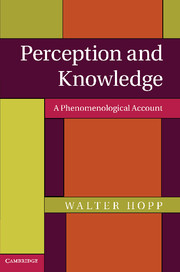Book contents
3 - Conceptualism and knowledge
Published online by Cambridge University Press: 21 April 2011
Summary
In the previous chapter I examined several phenomenological arguments for experiential conceptualism. This chapter is devoted to evaluating what I take to be the most influential and widely endorsed argument for EC, the epistemological argument. According to the epistemological argument, experiences must have conceptual content, because it is only in virtue of possessing such content that they can justify empirical beliefs. My strategy is to examine two of the most thorough and widely known presentations of the argument, those of John McDowell and Bill Brewer, and conclude that the arguments they present are unsuccessful. In the following chapter, I will present an argument that no conceptualist position such as theirs can adequately explain the epistemological role of perceptual experience in terms of conceptual content.
Donald Davidson argues that since “sensations” are not propositional attitudes, the “relation between a sensation and a belief cannot be logical” (Davidson 2001: 143). Rather, Davidson somehow finds it “obvious” that the relation between sensations and belief must be causal – apparently causal and logical relations exhaust the sorts of relations available to us. In this sense, and only in this sense, can sensations be considered the ground of our beliefs. “But,” Davidson points out, “a causal explanation of a belief does not show how or why the belief is justified” (ibid.). It is not clear whether Davidson identifies perceptual experiences with these sensations which, allegedly, are epistemically worthless, but he does assure us that “nothing can count as a reason for holding a belief except another belief” (141).
- Type
- Chapter
- Information
- Perception and KnowledgeA Phenomenological Account, pp. 81 - 102Publisher: Cambridge University PressPrint publication year: 2011



